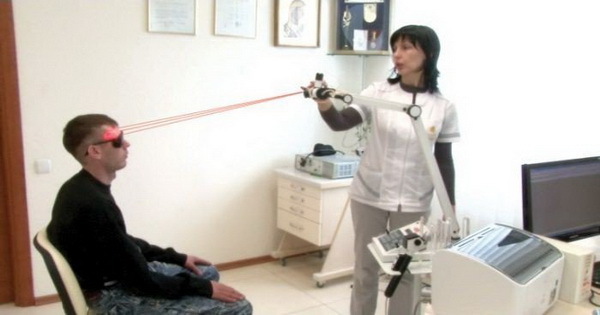Dissociative amnesia
 Dissociative amnesia, formerly referred to as psychogenic amnesia, is a condition included in a group called dissociative disorders. These are diseases in which violations or impairments of consciousness, memory or authenticity of perception are noted. When one of these functions is broken or more, the symptoms appear. They can interfere with the overall functioning of a person, including work and social activities, as well as relationships in society.
Dissociative amnesia, formerly referred to as psychogenic amnesia, is a condition included in a group called dissociative disorders. These are diseases in which violations or impairments of consciousness, memory or authenticity of perception are noted. When one of these functions is broken or more, the symptoms appear. They can interfere with the overall functioning of a person, including work and social activities, as well as relationships in society.
Dissociative amnesia occurs when a person overcomes certain information, most often associated with a traumatic or stressful event. This leads to the fact that a person can not recall any important personal information. With such frustration, the degree of memory impairment does not fit into the framework of normal forgetfulness and contains the memory dips for a long time or memory, which is associated with traumatic events.
Dissociative amnesia is not one and the same as ordinary amnesia, which is the loss of information from memory, in most cases due to damage or brain disease. With dissociative amnesia memory exists, only it is hidden deep in the human brain and it is not possible to restore it. However, memory has the property of recovering spontaneously or after a certain push, which may be some event or some object from the patient's environment.
Causes of dissociative amnesia
Dissociative amnesia is usually associated with severe stress, which can be a consequence of past traumatic experiences, such as accidents, war, natural disasters or rape, to which a person has been exposed or witnessed.
Also to the powerful life shocks are the death of a loved one, a break with a loved one, financial bankruptcy. In the same way, one can forget( amnesirovat) actions that were caused by a sense of guilt or insoluble situations, according to the person, in addition, illegal behavior and conflicts with others. It is believed that in some individuals, in particular those who easily give in to hypnosis, amnesia happens more often.
Among the reasons for the development of dissociative disorders, including dissociative amnesia, there may also be a genetic component, since people with such disorders often have close relatives who have had similar conditions.
In women, dissociative amnesia is more common than in men. Cases of dissociative amnesia occur more often during traumatic or stressful situations, for example, military actions, natural disasters or the consequences of such.
Symptoms of dissociative amnesia
The initial sign of dissociative amnesia is a sudden state of mind in which it is impossible to recall previous experience or information that is personal to a person. Some of the patients with such a disorder may have an embarrassed appearance and suffer from depression and / or anxiety.
Diagnosis of dissociative amnesia
In the event of symptoms, the physician will begin the examination by examining the patient's complete medical record and physical examination. Despite the fact that laboratory tests for specific diagnosis of dissociative disorders do not exist, the doctor can apply various methods of diagnosis, such as radiography and blood tests, in order not to take side effects from the action of drugs or a physiological illness for the causes of the symptoms. Some conditions, including craniocerebral trauma, brain disease, sleep deprivation and intoxication with alcohol or drugs, can lead to symptoms similar to dissociative disorders, including amnesia.
If no disease is found, the patient may be referred to a psychologist or psychiatrist, a specially trained diagnosis and treatment of mental illness. Psychologists and psychiatrists use special interviews and assessment tools to determine if a person suffers from a dissociative disorder.
Treatment of Dissociative Amnesia
The first goal of treatment involves relaxing the symptoms and controlling any behavior problems. Therapy is then designed to help the patient painlessly express and process their hard memories, receive and develop new skills that help cope with the events and experiences of life, resume its activities and improve relationships in society. The ideal approach to healing depends on the personality and severity of the symptoms. Methods of treatment can be as follows:
Psychotherapy: this type of therapy, used for psychotic and emotional disorders, uses psychological techniques designed to endorse discussion of conflicts and increase the ability to penetrate the meaning of problems.
Cognitive therapy: this type of therapy is specialized in changing the patterns of dysfunctional thinking and the feelings or behavior of the patient.
Drugs: There are no drugs for the treatment of directly dissociative disorders. However, a person with such a disorder who is also susceptible to depression or anxiety is able to get the effect of the treatment that is carried out by such medications as antidepressants and anxiety relieving agents.
Creative therapy( music therapy, art therapy): these therapies allow the patient to study or express their thoughts and feelings in an innocuous and creative way.
Family therapy: this type of therapy aims to inform the family about the ailment and its causes, and also to help family members identify the symptoms of relapse.
Clinical hypnosis is a method of treatment that uses intense relaxation, focusing and focusing attention to reach an altered state of consciousness, allowing a person to explore thoughts, memory and feelings that he probably hid from his own consciousness. The use of hypnosis in the treatment of dissociative pathologies is controversial, due to the risk of false memories.
Perspective for people suffering from dissociative amnesia
Prospects depend on a number of factors, including the person's life situation, the availability of support systems and his response to treatment. To the bulk of people suffering from dissociative amnesia, memories eventually return and the overall prognosis is very good, but people are irretrievably deprived of the ability to extract their deeply buried memories.
Prevention of dissociative amnesia
Contrary to the fact that there is no way to prevent dissociative amnesia, it is very useful that therapy be started as soon as a person begins to show symptoms of amnesia. Immediate intervention after experiencing a traumatic or emotionally agonizing accident can help reduce the likelihood of dissociative disorders.



